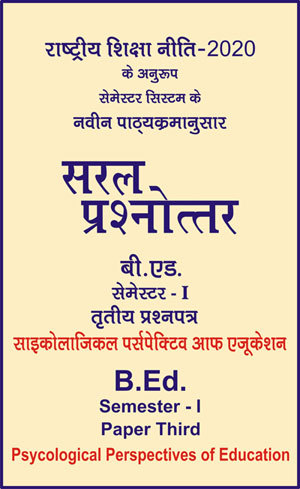|
बी एड - एम एड >> बी.एड. सेमेस्टर-1 प्रश्नपत्र-III - साइकोलाजिकल पर्सपेक्टिव आफ एजूकेशन बी.एड. सेमेस्टर-1 प्रश्नपत्र-III - साइकोलाजिकल पर्सपेक्टिव आफ एजूकेशनसरल प्रश्नोत्तर समूह
|
5 पाठक हैं |
|||||||
बी.एड. सेमेस्टर-1 प्रश्नपत्र-III - साइकोलाजिकल पर्सपेक्टिव आफ एजूकेशन (अंग्रेजी भाषा में)
Question- What is the importance of motivation in learning?
Or
Write a note on importance of motivation.
Answer-
Importance of Motivation in Learning
Motivation is an internal process. It makes us take actions. It is a desire to work in service of goal. In simple words, motivation is an enthusiasm or desire to achieve goal or a stage of readiness to get the goal.
It helps a person to achieve his / her aim. If a person is motivated so he will have job satisfaction.
Motivation plays very important role in life. A motivation student or person works well in caparison of non motivated motivation builds determination to achieve something like securing good marks, losing weight getting higher a position.
Motivation is also very important in learning. In the field of learning if you are motivated then you can work with more efficiency focused way and with a zeal. It gives you power to get something. Motivated students are more excited to learn and participate. Motivation is not only essential for a learner, It is also very important for teacher. A motivated teacher is crucial in creating a successful. Learning environment. Motivation helps to direct and sustain positive behaviour over a long period of time.
The purpose and importance of motivation should be clearly understood by the teacher. The fundamental aim of motivation is to stimulate and to facilitate learning activity. Learning is an active process that needs to be motivated and guided toward desirable ends.
Learning is self-initiated, but it must be aided by motives so that the learner will persist in the learning activity. A definite motive is valuable in all work, as motives make for readiness. The greater the readiness, the greater will be the attention given to the work on hand and the sooner will the desired result be achieved. It is important to attempt to get the learner into a state of readiness for it increases the alertness, vigor, and wholeheartedness of learning. In trying to achieve some end, the more acute the readiness, the more satisfying the reaction.
The teacher must be continually on the alert to perceive these differences and fluctuations. Since all learners do not react similarly, the motivation of learning must be varied for different individuals. An understanding of the nature of motivation is important, because motivation determines, not only the intensity of the effort to learn, but also the extent to which this effort is made an activity of the total personality.
Motivation of learning activities help the pupil to concentrate on what he is doing, and thereby to gain satisfaction. Continuous motivation is needed to help learners concentrate on the lessons to be learned. The importance of motivation in its simplest form is seen in the experiments made in the way animals and human beings learn.
In human learning, the motives that are applied most often are the impulse to mastery and the desire for social approval. As shown by experiments, the impulse to mastery is the most effective motive for learning. The mastery motive can be utilized in directing the learning process by the use of the teacher’s marks, scores in objective tests, and the graphic records of progress.
From experiments with a couple of high school students,
Turney came to the conclusion “that the two major factors in school achievement are intelligence and motivation, and that the latter is most important.”
Book likewise asserts that “motivation is the control factor in every learning process.”
In the same manner McMurry once said. “I believe that motivation is the most important principle in education.”
Thorndike makes the same point in explaining that “thought and action occur largely in the service of wants, interest, and attitudes and are stimulated and guided by them.”
|
|||||














